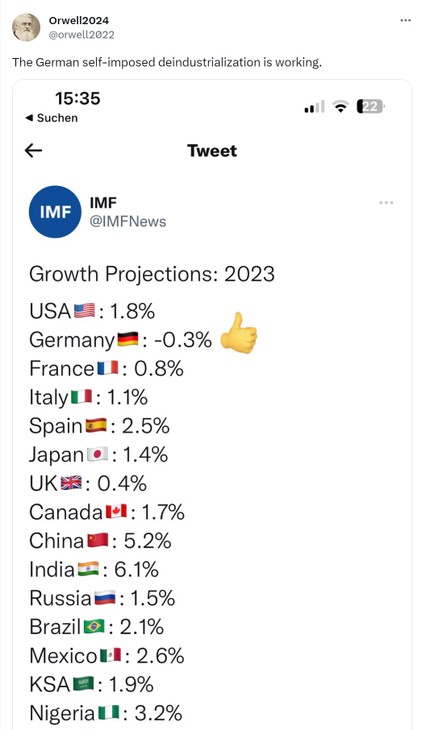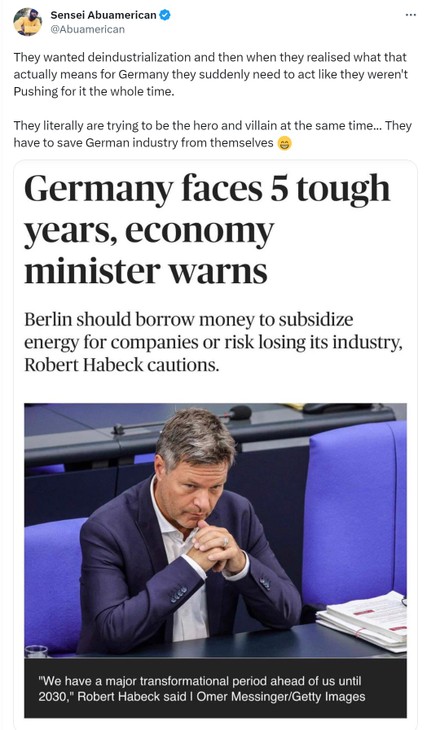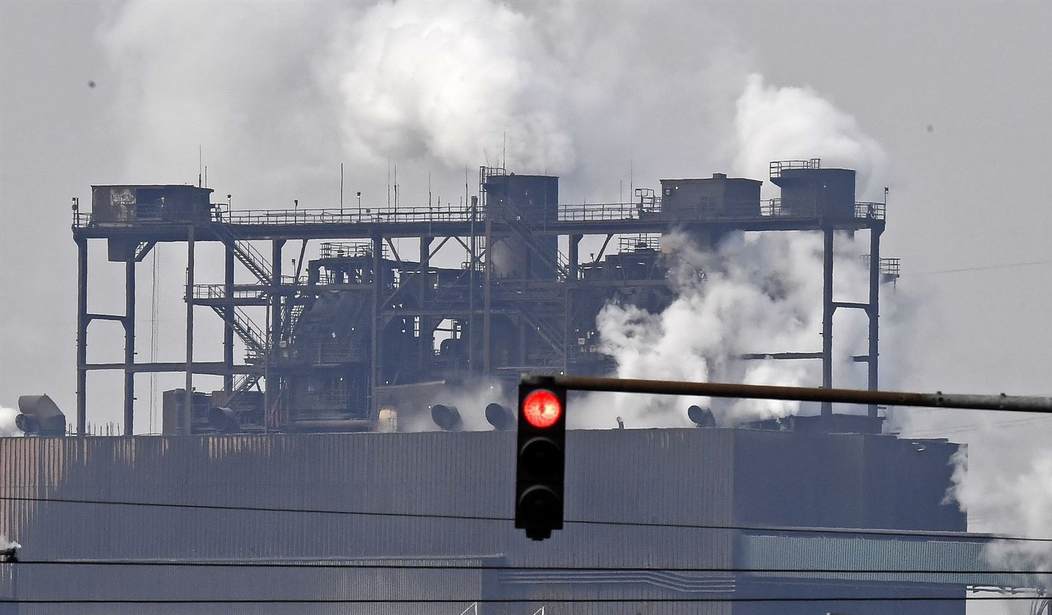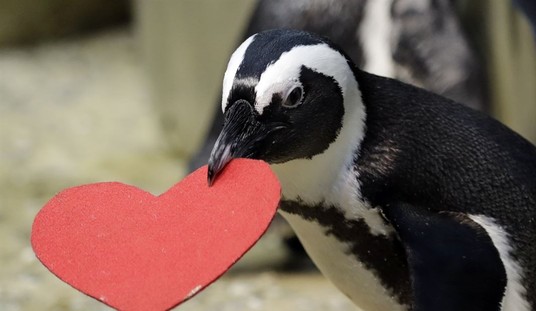And the German government seems frozen in indecision and confusion.
What on earth could have caused this looming calamity?
Friedrich Merz, the chairman of the opposition Christian Democratic Union (CDU), has told a German news agency that the German economy is projected to be the worst-performing among the G7 nations this year.
Merz highlighted several concerning economic indicators, such as a rise in unemployment during the summer, a contraction in industrial production, and a significant 16% increase in bankruptcies in the first half of 2023. That has raised concerns about further economic decline and deindustrialization in the country.
“Germany is losing competitiveness. This is not an abrupt process that triggers an overnight economic crisis [and] instead, we are experiencing a gradual process of deindustrialization in our country. You have to take this very seriously [because] something is happening here at the moment that may no longer be reversible. The federal government must react to this now,” Merz cautioned.
It’s not at all good news for what was once the industrial and economic powerhouse of the EU. And when the Italians, of all people, are eating your lunch?
Gads. That’s mortifying.
…The industrial decline in Germany, revealed by S&P Global’s purchasing manager index, has overshadowed the continued expansion in the service sector, impacting not just the nation itself but also having repercussions on other economies within the region. Shockingly, Germany is expected to be the only G7 nation experiencing economic contraction this year, a situation that demands urgent attention and action.
Though the predicted full-year decline of 0.3 percent in Germany’s GDP may not appear substantial, it holds significant implications. The fact that this will be the first time since 2003 when Germany’s GDP decreases while Italy’s increases, underlines the severity of the economic challenges facing the country.

One of the perpetual villains in any piece about German Green schemes and how they’ve adversely affected the once great German economic juggernaut is Robert Habeck, Green party leader and German Vice-Chancellor. As Green chickens come home to roost, his party is getting shellacked in local elections, creamed in polling for the national ones, and they are beginning to sweat.

The policies and over-regulation are being assailed on every front and from every industry. It is absolutely crippling the competitive edge German companies once enjoyed. What employee hires happen are not going towards production, but towards administrative offices, just to handle the red tape engendered by the restrictive regulatory climate. In an interview, Toralf Haag, the CEO of the German Voith Group, was pessimistically blunt about industry’s future in Germany.
Companies are pulling up stakes.
…When asked about the current state of business and investment opportunities in Germany, he wasn’t very optimistic, not only about the prospects for his company (based in Heidenheim, operating primarily in energy, automotive and paper industries), but the overall situation.
“Investment decisions in Germany are becoming increasingly difficult,” Haag said, adding: “To be honest, at the moment we tend to choose Eastern Europe, Asia or the USA when it comes to new production facilities because the costs for energy and personnel are particularly high in Germany while at the same time bureaucracy and regulation are increasing.”
He lamented that the Voith Group was forced to hire another 30 people in the management in the last year or two just to be able to handle all the new regulations and obligations introduced due to the ever-growing red tape.
“I would like to invite the employees from the ministries to check what effect their specifications have directly inside a company – whether they are practicable and sensible. In order for Voith to make significant investments in Germany again, the framework conditions must change fundamentally. Unfortunately, I don’t see that at the moment,” Haag stated.
He said that the danger of Germany’s further deindustrialization is “very great”, primarily because of the reduction of industrial activity due to the tendency of many German companies to relocate to other countries.
But sweating doesn’t necessarily mean that the Greens are willing to change. They are still pushing transitions to electrical appliances and systems that they do not have the electrical generation capacity for.
At least 500,000 heat pumps should be connected to the grid next year, and by 2030 the total nationwide number should be six million. This means that the demand for electricity will increase sharply. In addition, there are thousands upon thousands of private charging stations for e-cars and photovoltaic systems, which put additional strain on the power grid. In some places there is already a crunch: transformer stations, connections and substations have to be rebuilt or replaced.
Can our power grid shoulder the heat transition?
Current: No! The regional suppliers are alarmed. “As of now, the grid is not yet ready for a complete energy transition. That’s why we have to invest so enormously,” says SachsenEnergie from Dresden
Blaming the Nordstream sabotage and war in Ukraine for the energy woes buffeting manufacturing has run its course. Industry people aren’t falling for the “Russian in the tailpipe” jokes anymore.
…”The German government is pursuing very foolish policies in other regards as well. First of all, there is the so-called green transformation or green agenda. Germany is trying to replace not only Russian energy but all fossil fuels, and it’s phased out nuclear energy,” Beck said.
🙈🙈🙈😳😳😳😡😡😡🇩🇪 GERMAN INDUSTRY IS DOOMED TO FAIL
With this headline, Die Welt publishes a detailed analysis of deindustrialization in Germany. The authors come to the most inconsolable conclusion: the decline of manufacturing in Germany is not seasonal, but systemic. pic.twitter.com/3xgRzOjack
— Malcolm X (@Malcolm85064573) July 30, 2023
It’s hard to believe we could see this happen before our very eyes, but there it is.
“Hard to believe” has been happening a lot.








Join the conversation as a VIP Member